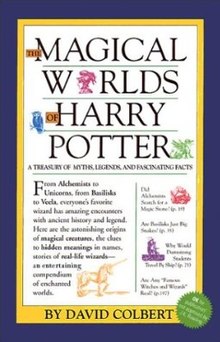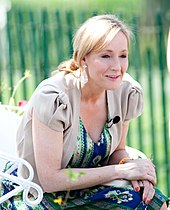In J. K. Rowling's Harry Potter series, a Muggle is a person who lacks any sort of magical ability and was not born in a magical family. Muggles can also be described as people who do not have any magical blood inside them. It differs from the term Squib, which refers to a person with one or more magical parents yet without any magical power or ability, and from the term Muggle-born, which refers to a person with magical abilities but with non-magical parents. The equivalent term used by the in-universe magic community of America is No-Maj, which is short for No Magic.

Prof. Albus Percival Wulfric Brian Dumbledore is a fictional character in J. K. Rowling's Harry Potter series. For most of the series, he is the headmaster of the wizarding school Hogwarts. As part of his backstory, it is revealed that he is the founder and leader of the Order of the Phoenix, an organisation dedicated to fighting Lord Voldemort, the main antagonist of the series.
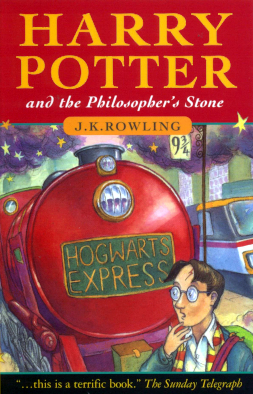
Harry Potter and the Philosopher's Stone is a fantasy novel written by British author J. K. Rowling. The first novel in the Harry Potter series and Rowling's debut novel, it follows Harry Potter, a young wizard who discovers his magical heritage on his eleventh birthday, when he receives a letter of acceptance to Hogwarts School of Witchcraft and Wizardry. Harry makes close friends and a few enemies during his first year at the school and with the help of his friends, Ron Weasley and Hermione Granger, he faces an attempted comeback by the dark wizard Lord Voldemort, who killed Harry's parents, but failed to kill Harry when he was just 15 months old.

The Death Eaters are characters featured in the Harry Potter series of novels and films. They are a radical group of wizards and witches, led by the dark wizard Lord Voldemort, who seek to purify the wizarding community by eliminating wizards and witches born to non-magical parents. They attempt to create a new order within the Ministry of Magic by spreading fear through the wizarding community and murdering those who speak out against them. Their primary opposition is the Order of the Phoenix.
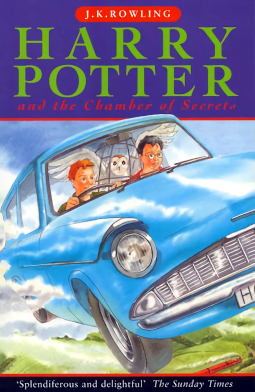
Harry Potter and the Chamber of Secrets is a fantasy novel written by British author J. K. Rowling and the second novel in the Harry Potter series. The plot follows Harry's second year at Hogwarts School of Witchcraft and Wizardry, during which a series of messages on the walls of the school's corridors warn that the "Chamber of Secrets" has been opened and that the "heir of Slytherin" would kill all pupils who do not come from all-magical families. These threats are found after attacks that leave residents of the school petrified. Throughout the year, Harry and his friends Ron and Hermione investigate the attacks.

Fantastic Beasts and Where to Find Them is a 2001 guide book written by British author J. K. Rowling about the magical creatures in the Harry Potter universe. The original version, illustrated by the author herself, purports to be Harry Potter's copy of the textbook of the same name mentioned in Harry Potter and the Philosopher's Stone, the first novel of the Harry Potter series. It includes several notes inside it supposedly handwritten by Harry, Ron Weasley, and Hermione Granger, detailing their own experiences with some of the beasts described, and including inside jokes relating to the original series.
In J. K. Rowling's Harry Potter series, magic is depicted as a supernatural force that can be used to override the usual laws of nature. Many fictional magical creatures exist in the series, while ordinary creatures also sometimes exhibit magical properties. Magical objects are also described. Witches and wizards refer to the rest of the population, who are generally unaware of magic, as "Muggles" in the United Kingdom and "No-Maj" in the United States.
J. K. Rowling's Harry Potter universe contains numerous settings for the events in her fantasy novels. These locations are categorised as a dwelling, school, shopping district, or government-affiliated locale.
Magical creatures are an aspect of the fictional Wizarding World contained in the Harry Potter series and connected media originally created by British author J. K. Rowling. Throughout the seven main books of the series, Harry and his friends encounter many of these creatures on their adventures in Hogwarts, the Forbidden Forest, or other locations throughout the Wizarding World. In addition, students learn to take care of creatures such as hippogriffs and unicorns in the Care of Magical Creatures class at Hogwarts. Rowling has also written Fantastic Beasts and Where to Find Them, a guide to the magical beasts found in the series, and based on the fictional textbook of the same name written by Newt Scamander and used by students at Hogwarts.
The fictional universe of British author J. K. Rowling's Harry Potter series of fantasy novels comprises two distinct societies: the wizarding world and the Muggle world. In the novels, the Muggle world is the world inhabited by the non-magical majority, with which the wizarding world exists coextensively, albeit mostly remaining hidden from the non-magical humans. The plot of the series is set in 1990s Britain, but in a veiled and separate shadow society wherein magic is commonly used and practised, and those who can use it live in self-enforced seclusion, hiding their abilities from the rest of the world. The term "wizarding world" refers to the global wizard community that lives hidden in parallel with the Muggle world; the different terms refer to different communities within the same area rather than separate planets or worlds. Any new works taking place in this universe are released under the "J. K. Rowling's Wizarding World" brand.

Harry Potter is a series of seven fantasy novels written by British author J. K. Rowling. The novels chronicle the lives of a young wizard, Harry Potter, and his friends Hermione Granger and Ron Weasley, all of whom are students at Hogwarts School of Witchcraft and Wizardry. The main story arc concerns Harry's conflict with Lord Voldemort, a dark wizard who intends to become immortal, overthrow the wizard governing body known as the Ministry of Magic and subjugate all wizards and Muggles.
In English folklore, grindylow or grundylow is a creature in the counties of Yorkshire and Lancashire. The name is thought to be connected to Grendel, a name or term used in Beowulf and in many Old English charters where it is seen in connection with meres, bogs and lakes.
Writer J. K. Rowling cites several writers as influences in her creation of her bestselling Harry Potter series. Writers, journalists and critics have noted that the books also have a number of analogues; a wide range of literature, both classical and modern, which Rowling has not openly cited as influences.
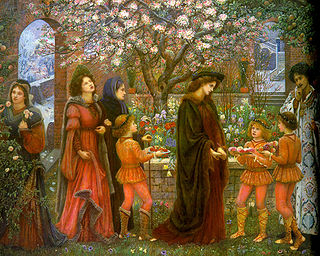
A magician, also known as an enchanter/enchantress, mage, magic-user, archmage,sorcerer/sorceress, spell-caster, warlock, witch, or wizard, is someone who uses or practices magic derived from supernatural, occult, or arcane sources. Magicians are common figures in works of fantasy, such as fantasy literature and role-playing games, and enjoy a rich history in mythology, legends, fiction, and folklore.
Harry Potter is a series of fantasy novels by J. K. Rowling.
Religious debates over the Harry Potter series of books by J. K. Rowling are based on claims that the novels contain occult or Satanic subtexts. A number of Protestant, Catholic, and Eastern Orthodox Christians have argued against the series, as have some Muslims. Supporters of the series have said that the magic in Harry Potter bears little resemblance to occultism, being more in the vein of fairy tales such as Cinderella and Snow White, or to the works of C. S. Lewis and J. R. R. Tolkien, both of whom are known for writing fantasy novels with Christian subtexts. Far from promoting a particular religion, some argue, the Harry Potter novels go out of their way to avoid discussing religion at all. However, the author of the series, J. K. Rowling, describes herself as a Christian, and many have noted the Christian references which she includes in the final novel Harry Potter and the Deathly Hallows.
A Pukwudgie, also spelled Puk-Wudjie, is a human-like creature of Wampanoag folklore, found in Delaware and Prince Edward Island, sometimes said to be 2-to-3-foot-tall.

Rubeus Hagrid is a fictional character in the Harry Potter book series written by J. K. Rowling. He is introduced in Harry Potter and the Philosopher's Stone as a half-giant and half-human who is the gamekeeper and Keeper of Keys and Grounds of Hogwarts, the primary setting for the first six novels. In the third novel Harry Potter and the Prisoner of Azkaban, Hagrid is promoted to Care of Magical Creatures professor, and is later revealed to be a member of the Order of the Phoenix. A loyal, friendly, softhearted personality who is easily brought to tears, he is also known for his thick West Country accent.
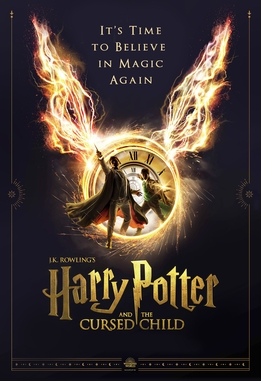
Harry Potter and the Cursed Child is a play written by Jack Thorne, based on an original story written by J. K. Rowling, John Tiffany, and Thorne. The story is set nineteen years after the events of Harry Potter and the Deathly Hallows. It follows Harry Potter, now Head of the Department of Magical Law Enforcement at the Ministry of Magic, and his son, Albus Severus Potter, who is about to attend his first year at Hogwarts School of Witchcraft and Wizardry. Rowling has referred to the play as "the eighth Harry Potter story".
Harry Potter: A History of Magic is an exhibition of real-world magical artefacts and history presented alongside artefacts from the development of J.K. Rowling's fictional Harry Potter series. The exhibition originally opened at the British Library in 2017, as part of celebrations for the 20th anniversary of the publication of Harry Potter and the Philosopher's Stone. It is also available online through the Google Arts & Culture platform and was presented at the New-York Historical Society beginning in October 2018. Two official publications, Harry Potter: A History of Magic and Harry Potter: A Journey Through a History of Magic, along with a BBC television documentary, were created in conjunction with the exhibition.
